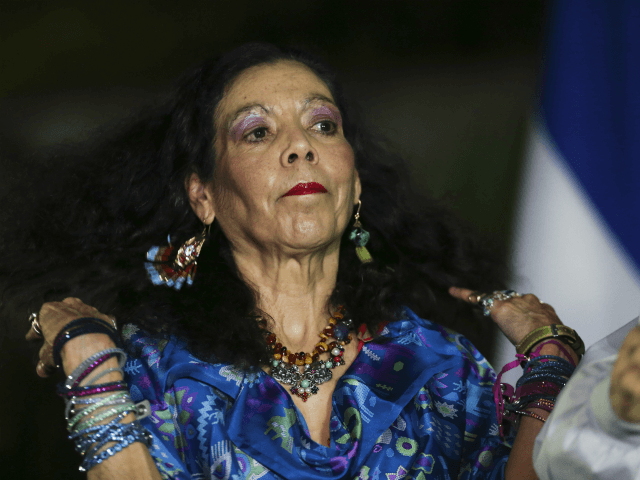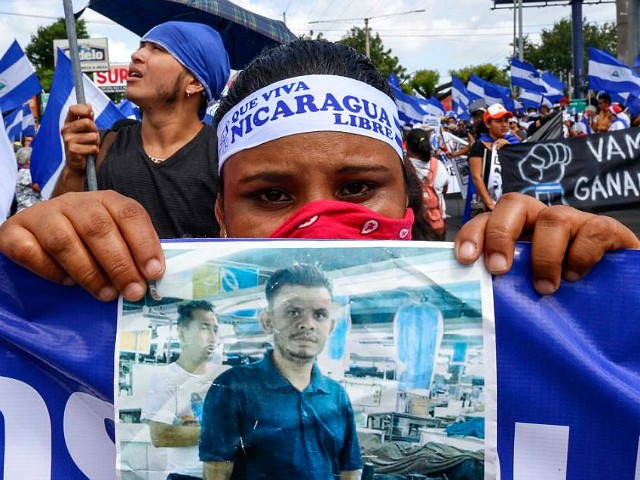The Nicaraguan Ortega regime published a series of photographs and videos this weekend of Matagalpa Bishop Monsignor Rolando Álvarez amidst growing pressure from human rights organizations and international groups that demanded proof of life for the Catholic priest.
The media, published via state-owned outlets aligned with the Ortega regime, mark the first time the priest has been seen publicly since being sentenced to 26 years in prison for “treason” in February and transferred to La Modelo prison, located on the outskirts of Managua.
“Thank God, [I am] well, with much inner strength, with much peace in the Lord and the Blessed Virgin,” the priest said in response to a question from a journalist of the state-owned Canal 4 channel.
The Ortega regime, facing pressure from local and international human rights groups that demanded proof of life of the bishop, allowed Vilma and Manuel Álvarez Lagos, two of his siblings, to visit him on Saturday. The relatives shared a meal with the 56-year-old priest under the watch of the regime’s prison security officials.
“We have talked, we have eaten very tasty food here, with a meal provided by the friends of the penitentiary system,” Monsignor Álvarez expressed to state-owned media, wearing the prison’s blue uniform and visibly thinner.
The Canal 4 interviewer told the bishop that he was glad to see him well and healthy, to which Álvarez responded “Ah! Good. Do you see me well? Healthy? And how do you see my face?”
Monsignor Álvarez, one of the most outspoken critics of Nicaragua’s Sandinista regime, was arrested alongside seven other members of the Catholic Church in August at the end of a two-week-long raid on the priest’s home by Nicaraguan police authorities.
The raid was carried out following accusations made by Rosario Murillo, Nicaragua’s vice president and dictator Daniel Ortega’s wife, who accused Álvarez of having committed “sins against spirituality.”

Rosario Murillo (Esteban Felix/AP)
Álvarez was the first member of the Nicaraguan Catholic Church arrested by Daniel Ortega’a regime since its return to power in 2007. The bishop was sentenced to 26 years and 4 months in prison in February for “treason,” “conspiracy to commit undermining national integrity,” and “propagation of false news.”
In addition to prison time, the Ortega regime stripped Álvarez of his Nicaraguan citizenship, rendering him a stateless person.
Álvarez refused to be included among the group of 222 political prisoners that the Ortega regime banished to the United States in February. Like Álvarez, the banished political prisoners were stripped of their Nicaraguan nationality.

A protestor holds a photo of one of the victims of the deadly protests during an anti-government march in Managua, Nicaragua, Saturday, Aug. 11, 2018. The current unrest began in April, when President Daniel Ortega imposed cuts to the social security system and small protests by senior citizens were violently broken up. From then more than 300 persons have died and demonstrators have demanded that Ortega leave power. (Alfredo Zuniga/AP)
Ortega punished Monsignor Álvarez for his refusal to be banished, transferring him from his house arrest to a maximum security cell at the Jorge Navarro penitentiary center in Tipitapa, also known as La Modelo. La Modelo, one of the most infamous prisons in Nicaragua, is known as a place where tortures and beatings occur on a daily basis.
“What we have is arrogant behavior, from someone who considers himself the head of the Church in Nicaragua, the leader of the Latin American Church, and must think that he is in line to be the pope,” Dictator Ortega said in February. “He is unhinged. Now that he arrived at La Modelo, he arrived like a madman. He doesn’t have the courage of Christ, who endured the lashes and endured the crucifixion. He does not accept that they put him in a cell where there are hundreds of prisoners.”
The other members of the Catholic church arrested alongside Monsignor Álvarez were sentenced in February to ten years in prison on “treason” and “fake news” charges.
Daniel Ortega, whose regime has historically maintained a fierce animosity towards the Catholic Church, has dramatically escalated his self-declared “war” against the Vatican and the Catholic faith since 2022 in retaliation for the Catholic Church’s continued aid of pro-democracy dissidents and longstanding opposition to the Sandinista regime. The relationship between the Ortega regime and the Nicaraguan Catholic Church became further strained after the Church sided with the Nicaraguan opposition during the April 2018 protests.
The latest escalation against the Catholic Church began in March 2022 with the banishment of the papal nuncio, Archbishop Waldemar Stanislaw Sommertag, from the country. Almost exactly a year later, Ortega, who claims that the Vatican is run by “terrorists” and accuses the Church of being “undemocratic” and a “dictatorship,” severed Nicaragua’s ties with the Vatican.
Ortega was responding to an interview in which Pope Francis compared Nicaragua’s situation to a “communist or Hitlerian“ dictatorship during an interview given to the Argentine news website Infobae published on March 10.
“With much respect, I have no choice but to think that the person who leads [Daniel Ortega] is unbalanced,” Pope Francis said.
The pope continued:
Here we have a bishop in prison, a very serious, very capable man. He wanted to give his testimony and did not accept exile. It is something that is out of what we are living, it is as if it were bringing the communist dictatorship of 1917 or the Hitler dictatorship of 1935, bringing here the same ones. They are a type of gross dictatorship.
The Ortega regime’s campaign against the Catholic Church in Nicaragua also resulted in the expulsion of a group of nuns in July, the forced shutdown of Catholic television and radio stations throughout the country, and the banning of several traditional Catholic processions, including all upcoming Holy Week processions, which will begin on April 2, Palm Sunday.
Monsignor Silvio Báez, auxiliary Bishop of Managua currently living in exile in Miami, reacted to the photos of Monsignor Álvarez through a post made on his Twitter account on Sunday, expressing happiness at seeing the photos of the bishop while demanding his liberation.
Me he alegrado mucho al ver las fotos de mi hermano, Mons. Rolando. ¡Doy gracias a Dios que está vivo! La escenografía de la dictadura ha sido repugnante y cínica y no borra su crimen. Se ha revelado la fuerza de la oración del pueblo y la presión internacional. ¡Libérenlo ya! pic.twitter.com/krtP4yRwKU
— Silvio José Báez (@silviojbaez) March 26, 2023
“I was very happy to see the photos of my brother, Bishop Rolando. I thank God that he is alive!” he wrote. “The scenography of the dictatorship has been disgusting and cynical and does not erase its crime. The strength of the people’s prayers and international pressure has been revealed. Free him now!”
Báez, another outspoken critic of the Ortega regime, fled from Nicaragua in 2019 at the request of Pope Francis due to threats made to his security.
Christian K. Caruzo is a Venezuelan writer and documents life under socialism. You can follow him on Twitter here.
